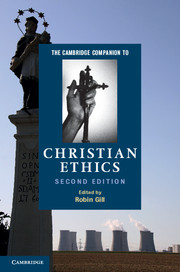Book contents
- Frontmatter
- Part I The grounds of Christian ethics
- Part II Approaches to Christian ethics
- 6 Natural law and Christian ethics
- 7 Virtue ethics
- 8 Gender and Christian ethics
- 9 Liberation ethics
- 10 Christian ethics in Asia
- 11 Christian ethics: a Jewish perspective
- 12 Other faiths and Christian ethics
- Part III Issues in Christian ethics
- Index
7 - Virtue ethics
from Part II - Approaches to Christian ethics
Published online by Cambridge University Press: 28 January 2012
- Frontmatter
- Part I The grounds of Christian ethics
- Part II Approaches to Christian ethics
- 6 Natural law and Christian ethics
- 7 Virtue ethics
- 8 Gender and Christian ethics
- 9 Liberation ethics
- 10 Christian ethics in Asia
- 11 Christian ethics: a Jewish perspective
- 12 Other faiths and Christian ethics
- Part III Issues in Christian ethics
- Index
Summary
A virtue is a trait of character or intellect that is in some way praiseworthy, admirable or desirable. When we refer to somebody's virtues, what we usually have in mind are relatively stable and effective dispositions to act in particular ways, as opposed to inclinations that are easily lost, or that do not consistently lead to corresponding kinds of action. And so, for example, someone who has the virtue of generosity will consistently respond in generous ways in a variety of situations, including those in which generosity is difficult or costly, in contrast to someone who is moved by pity to one uncharacteristically generous act, or someone whose generous impulses are frequently overcome by desires for self-indulgence. Today, the virtues are normally understood to be morally praiseworthy traits of character, but this has not always been the case. For example, many ancient and medieval writers considered intelligence and wit to be virtues.
Probably every society has identified certain human characteristics as being especially praiseworthy and worth cultivating, while also identifying others as vices, which are morally corrupt, contemptible or otherwise undesirable. These traditions of virtues, in turn, have frequently given rise to systematic reflection on what it means to be virtuous. Virtue ethics, understood as a process of systematic, critical reflection on the virtues and related topics, is particularly likely to emerge in conditions of social change, when received traditions of the virtues undergo development and criticism. These observations apply to Christian societies as much as to any others.
- Type
- Chapter
- Information
- The Cambridge Companion to Christian Ethics , pp. 87 - 102Publisher: Cambridge University PressPrint publication year: 2011

